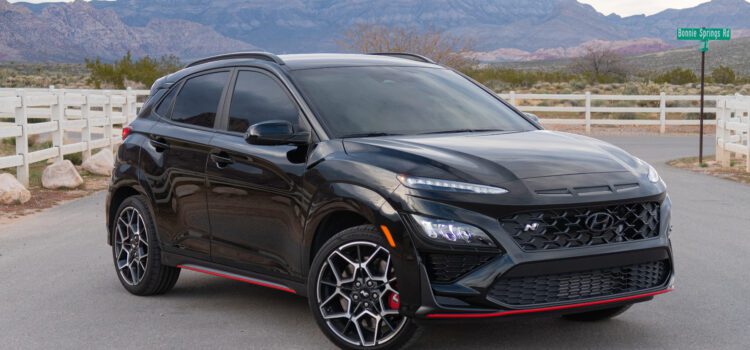The Hyundai Kona N is a superb used car bargain for those who can’t afford a Macan
On the first day, Albert Biermann created the Hyundai N division so that Korea may have the means to stand up to its incessant German and Japanese rivals. On the second day, Biermann created the Veloster N so that Road & Track staffers’ heads may explode in ecstasy over Korea’s newfound affinity for affordable driving dynamics. On the third, he crafted the Elantra N so that I could go to the mall for Donut Media stuff (no, seriously). And on the fourth, he spawned the Hyundai Kona N so that young urbanites and small families may, too, experience the wonders of burble tunes and dual-clutch gearboxes.
Alas, the Kona is a relatively new face in a saturated segment, having only begun life in 2017 and the N joining the lineup in 2021. A second-gen car had only recently appeared as of 2023, yet the Kona has proven to be a favorable choice and a hot seller among buyers. Heck, all of Hyundai has proven favorable in recent years. So, how about a used one? Is a used Hyundai Kona N worth the coin for that discerning enthusiast who may be looking for a sporty daily or a higher-riding alternative to the typical GTI? Hmm, let’s see.
Skip to section:
[Button id=”531″]
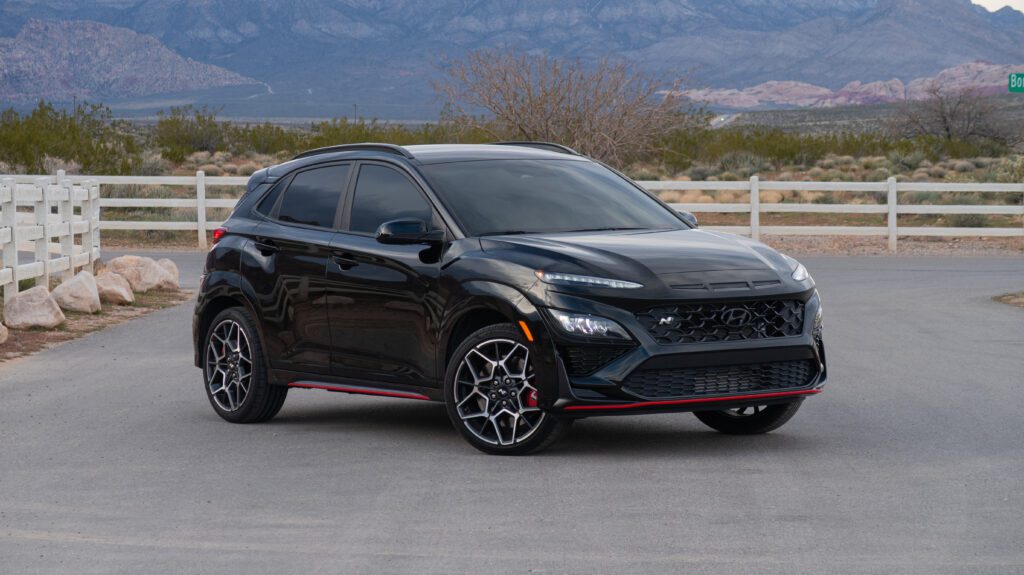
(Author’s Note: Special thanks and shoutout to my friend for loaning her 11,000-mile Kona N for a couple of afternoons to gather driving impressions.)
Price and specs
The Kona N sold with an MSRP of roughly $35,000 before taxes and fees, approaching a base model GR Corolla or a loaded Subaru BRZ tS. However, unlike those two, the Kona offers a taller seating position and more ground clearance for the urban rally stage and, for better or worse, front-wheel drive with an eight-speed dual-clutch gearbox only. Like the Elantra N, the Kona shares its 2.0-liter turbocharged heart that spews out a healthy 286 horsepower and 289 pound-feet of torque, enabling 0-60 in as quick as 4.8 seconds. At roughly 3,340 pounds, the Kona N is just a touch heavier than the Elantra but about on par, if not a bit lighter, than a current-gen Subaru WRX.
| New prices (2024): | $34,950 |
| Approximate used prices: | $24,000 to $30,000 |
| Engines choices: | 2.0-liter turbocharged inline-four |
| Transmission choices: | 8-speed dual-clutch automatic |
| Drivetrain choices: | Front-wheel drive |
| Power: | 286 horsepower |
| Torque: | 289 pound-feet |
| Weight: | 3,340 |
| 0-to-60 mph: | 4.8 seconds |
| 1/4-mile: | 13.4 seconds @ 105 mph |
| MPG: | 20 city, 27 highway, 23 combined |
| Fuel capacity: | 13.2 gallons |
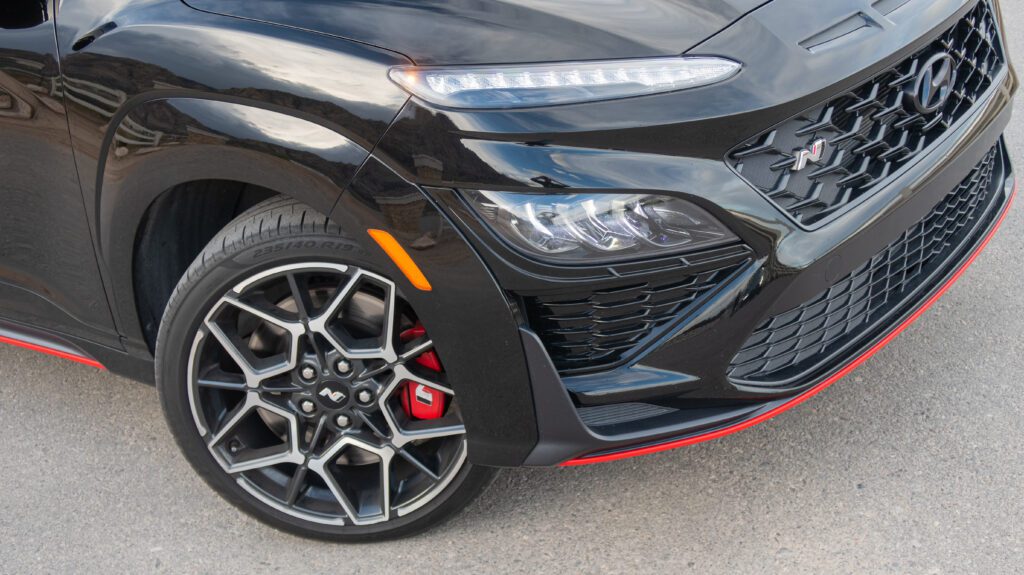
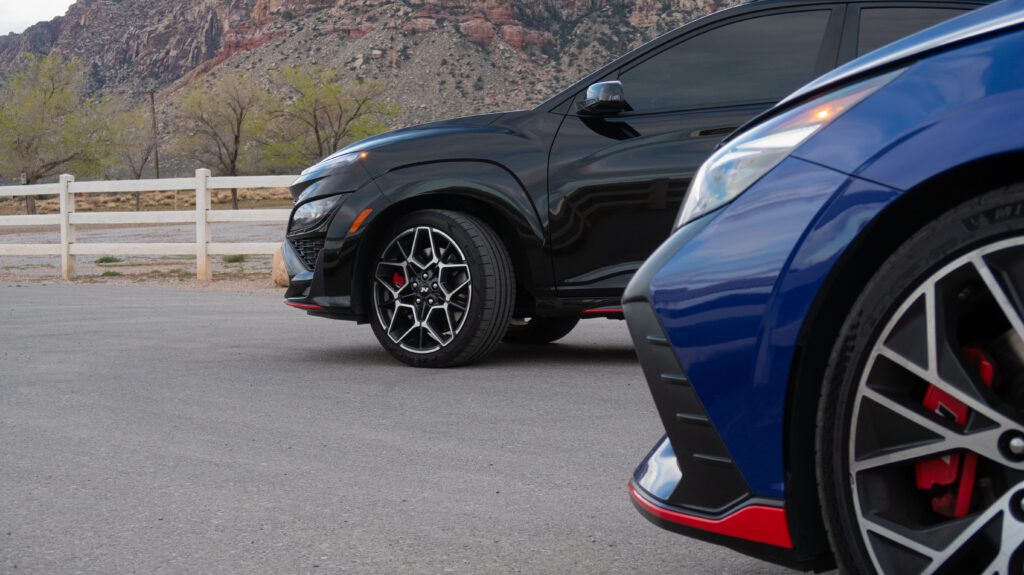
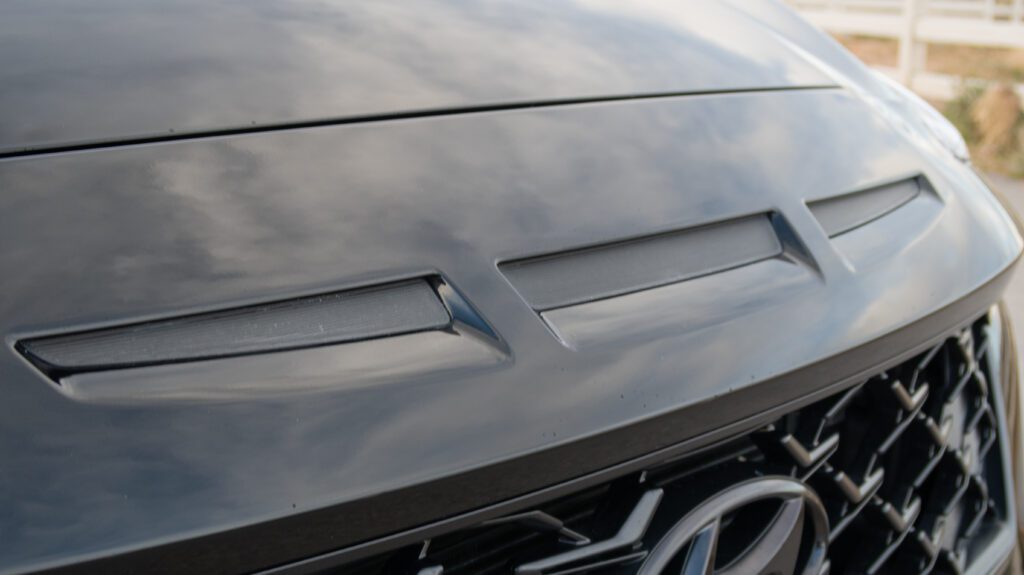
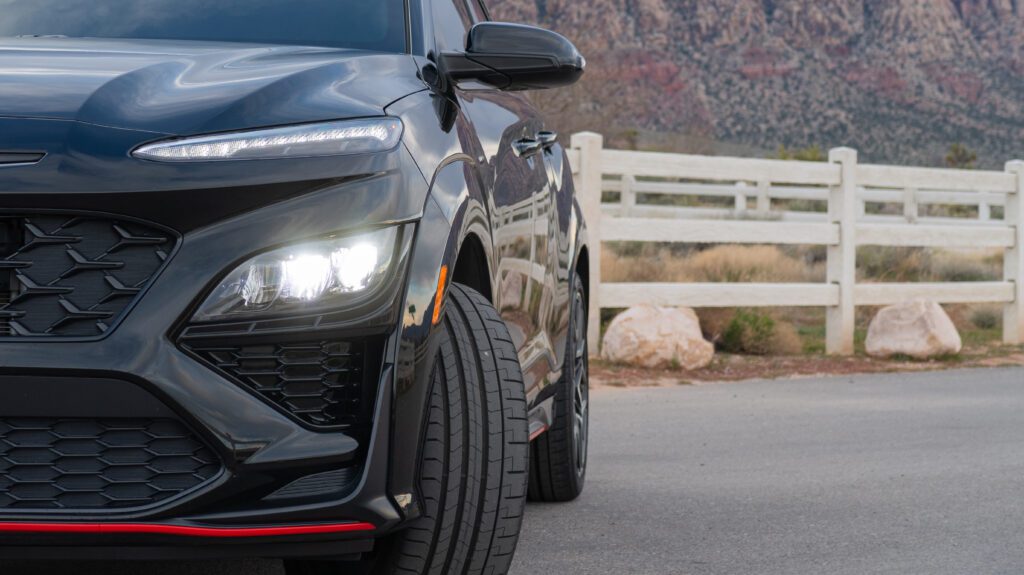
Not bad for a family crossover, and fuel economy is quite good by performance car standards, if unremarkable by crossover standards or four-cylinder cars in general. But by eyeing the N model in particular, you ought to know what you’re getting into. It’s a family car built to go from Namyang to the Nürburgring, not just the elementary school to Costco. Kona Ns are fairly well-appointed, featuring CarPlay and Android Auto, built-in GPS navigation, heated seats, a digital gauge cluster, and single-zone automatic climate control.
No sunroof or all-wheel drive options are available, but all Kona Ns are backed by Hyundai’s generous and well-received five-year, 60,000-mile basic and 10-year, 100,000-mile powertrain warranties. One whole decade. Given the Kona N’s infantile age compared to other sport compacts, this warranty ought to still be well within its timer and of great use to prospective buyers for years to come.
| What’s hot? | – Unmistakably fast – Corners like a champ despite tall height – Snappy, smart-shifting dual-clutch programming – Ergonomic interior with comfortable seating – Eager, playful demeanor – Quick-responding, easy-to-reach infotainment |
First-generation Kona N and the only N so far (2022 to 2023)
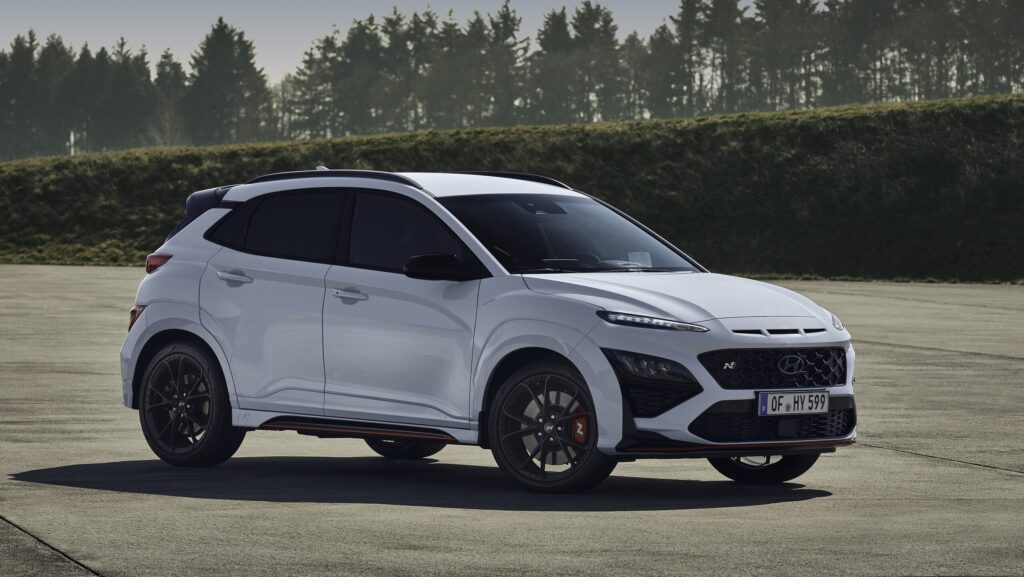
Huzzah! There she be. The first-gen and, so far, only-gen Kona N, running for only two years in the United States with pretty much no major revisions or additions, only to be snuffed out by the arrival of a new-gen Kona, which more closely follows Hyundai’s current design philosophy. All Kona Ns, like my tester, are specced exactly the same: turbo-four ganger routing 286 horsepower through an 8-speed DCT to the front wheels only. Your options are colors and any available dealer accessories. And then there’s that super angular love-it-or-hate-it styling that grows on you after a while.
Second-generation Kona with no N model as of yet (2024 to present)
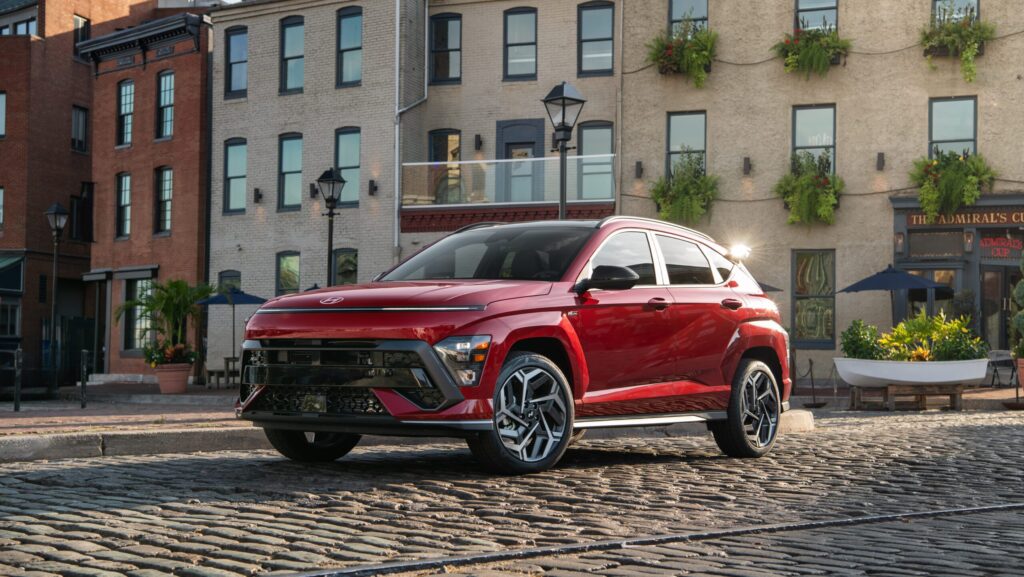
You’d be hard-pressed to believe the outgoing N is a Kona if you’ve only seen the new generation or be dumbfounded thinking the new one is a Kona if you’ve only seen the first generation. The new Kona sports standout styling akin to an Ioniq having a child with a Genesis, complete with front and rear light bars and the Elantra’s signature “Z” body lines carved into the doors. The outgoing Kona is also a significantly smaller car as the new model grows an inch in height, an inch in width, seven inches in length, and over two inches in wheelbase, all in the name of cabin space and refinement. While there’s no full-on N model yet, there is the peppy, 190-horsepower N-Line, but the increased size translates to increased weight, which has reportedly taken a toll on handling and performance. This presents a challenge for any future N variant to overcome, but it’s certainly nothing Biermann’s crew can’t handle, should they decide to make one.
[Button id=”469″]
Review round-up
Existing for only two model years, it’s tricky to gauge the Kona N’s long-term reliability. But I’ll take the internet’s word that the Hyundai N family, in general, is usually nothing short of bulletproof. Some higher-mile examples across CarGurus barely crest 60,000 miles, just timing out of their basic warranties but still well within their powertrain warranties. Perhaps the biggest complaint about an N is that it can be a little raucous to those unprepared to saddle themselves with something so focused and over the top compared to a run-of-the-mill Kona, Elantra, or Veloster. To some, the ride can still be a tad too firm, even in the softest settings, but thankfully, the Kona is graced with a comfort seat option that Elantras don’t get, and Velosters no longer offer.
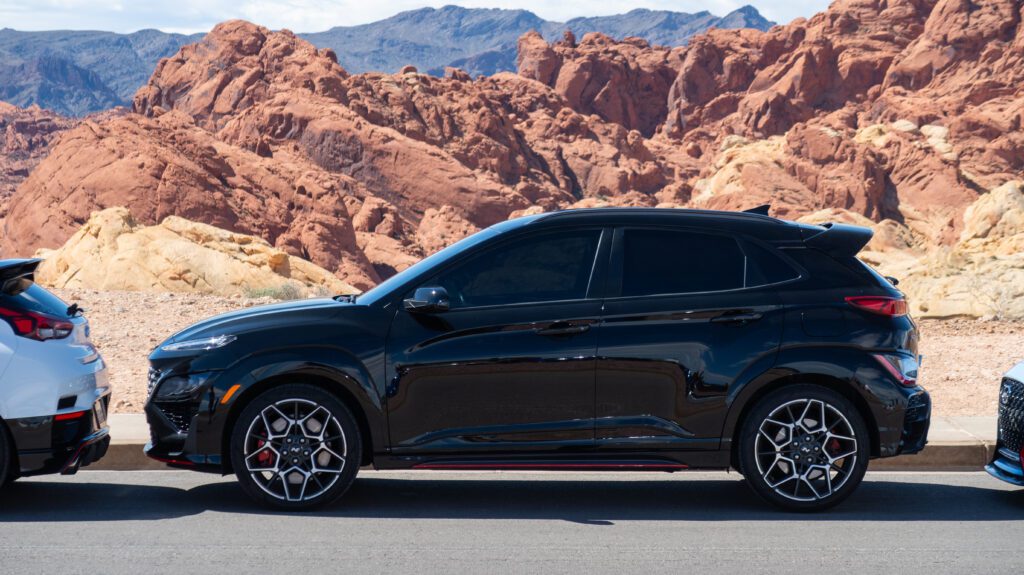
The Hyundai’s grip is stupendous, and the wheel transmits steady chatter from the road, such that you feel in your hands when the pavement abruptly transitions from smooth and fresh on the North Carolina side to patched and parched in Tennessee. Detecting that we’re up to some hijinks, the Kona’s N Track Sense Shift transmission software starts aggressively downshifting for corners and holding gears to redline all on its own.
Ezra Dyer, Car and Driver instrumented test, July 2022
Around town, there can be a little head toss with the suspension in its firmer Sport mode, but the crossover is otherwise perfectly poised. Hitting our local canyon road, we were continually amazed by the grip levels. No matter how much we turned the steering wheel or otherwise tried to induce slip, it just never gave up traction. The Kona N simply sticks and goes no matter how hard you try to break its resolve. It’s unflappable.
Bob Hernandez, Motor Trend instrumented test, August 2022
The Kona N makes for a compelling solution to these hollow excuses [saying one can’t have an enthusiast car because it sacrifices practicality]. It’s small enough to parallel park in New York City, practical enough for a shopping spree, and economical enough that I didn’t feel like I was breaking the bank, even as I filled up with premium gas.
Aaron Segal, The Drive review, September 2022
Driving the Kona N spiritedly on back roads is fun. It’s super quick. You get grippy Pirelli summer tires (miraculously, still on my test car in November), relatively spot-on steering and a lot of feedback from the road. But unlike a GTI or a Type R, it doesn’t feel ironed over at all. You have a high center of gravity and a short wheelbase — 4.5 inches shorter than the Elantra N’s — which adds up to less stability. Normally-smoothed-out features like torque steer, body roll and tires scrambling for grip are readily apparent.
Tyler Duffy, Gear Patrol review, December 2022
The Kona N is only going to make sense to a certain subset of people. Those people will really, really love it. It seems like Hyundai’s attempt to give us a hot hatchback in a shape that the market is really into right now, the compact SUV. As a former GTI owner, the Kona N still has some of the same characteristics of the GTI and other hot hatchbacks of days gone by: a practical shape for folding down the rear seats and shoving in a bike or a dresser on occasion, a reasonably small footprint, and performance numbers that will shock people who judge cars by their badge. The Kona is just a lot less subtle about all of it. The styling is good looking but definitely not understated,
Consumer review on 2022 Kona N, Kelly Blue Book
While all of this is great, what really brings it all home for me is the day to day livability, and in this regard I think the Kona N has a leg up on the Elantra N, which I’ve also driven. The seats are great. They hold you in but don’t feel too stiff, and the leather/suede combination (I’m not sure if they’re real or imitation materials, but they feel great) is nice. While the interior won’t be confused for a luxury car, it feels solidly built and all the touch points are nice enough that the car never feels cheap. All of the lighted interior parts illuminate in blue as well, which is a cool touch that people don’t seem to be talking about. As a daily driver it really gets the job done, and you can fit four average sized adults in it no problem… Although people above six feet will probably struggle in the back seat, so keep that in mind.
Consumer review on 2022 Kona N, cars.com
I wanted a car that was functional but also very fun to drive. In comes the Hyundai Kona N. It’s not your typical CUV, it has a drivetrain that can be found in the Touring America TC race series Hyundai Elantra and Veloster. I can tote around my mom and her wheel chair while having fun carving the mountain roads (safely of course).
Consumer review on 2023 Kona N, cars.com
This car is a hoot to drive, and it also causes lots of glances over as you tear away from other cars when you are simply just driving around. Even in Eco mode the exhaust has some nice notes. The only issue is the suspension, but that should be expected given that this is a track-ready car.
Consumer review on 2022 Kona N, cars.com
Again, the standout complaint seems to be an overly stiff ride, which varies from person to person. More on ride quality in my driving impressions. And again, reliability talk seems to take a back seat as the cars are too new to have many nasty gremlins rear their ugly heads. But if magazine long-term tests and social media banter about other N cars are anything to go off, reliability should be of little concern to prospective owners, with little-to-no major hiccups reported and only a few people experiencing odd flukes that were never replicated. Car and Driver’s Veloster N long-term car experienced an unknown electric fluke that a computer reflash solved, and it never appeared again.
If anything, forums have reported a few high-pressure fuel pump failures with track-driven or heavily modified Veloster Ns, but some users are quick to note that these are uncommon occurrences and that Hyundai has otherwise made big strides in the reliability of its entire lineup. Buyers should also note if the cars they’re shopping for have had a particular recall, Safety Recall 236, regarding the 8-speed DCT resolved or not.
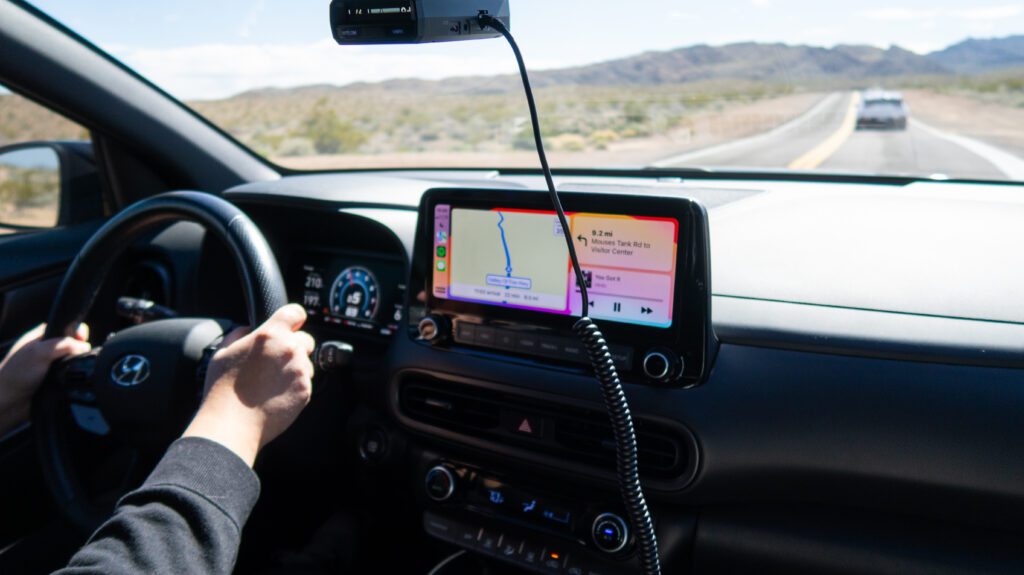
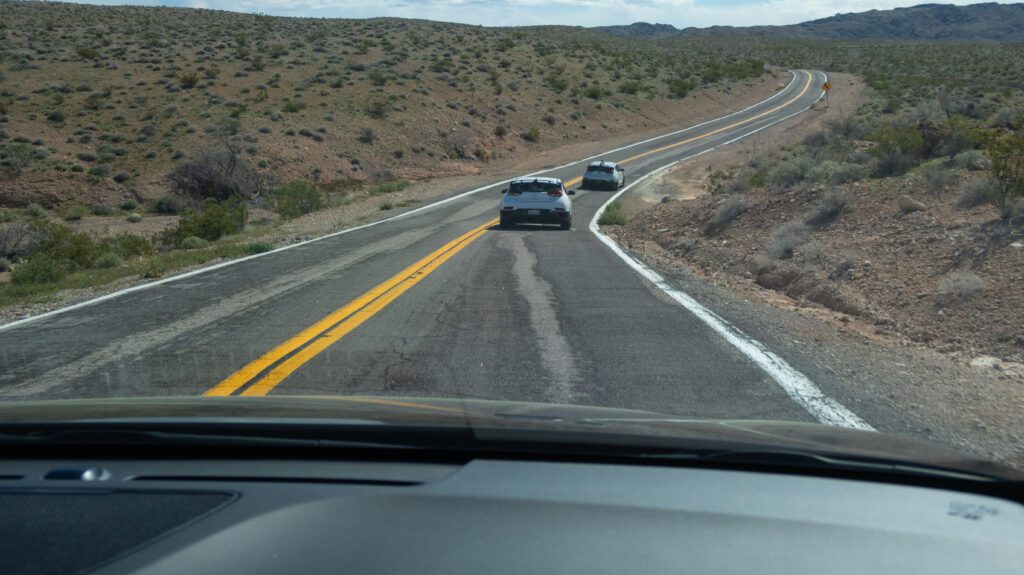
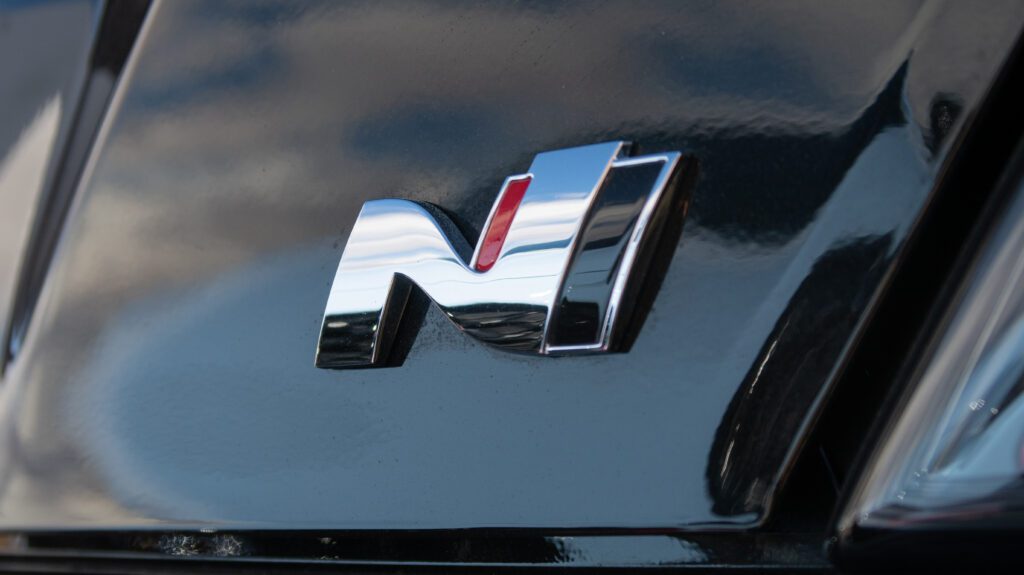
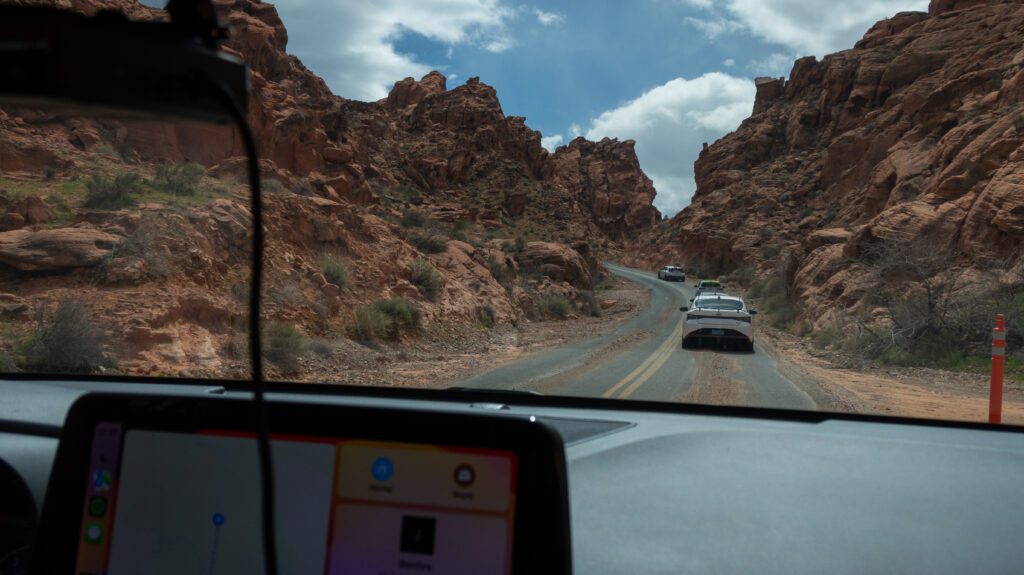
Driving impressions
The cool parent’s crossover
Well, how does the “broke-person Macan” drive? Out-freaking-standing, I say.
In Normal and Eco drive modes (and paying zero attention to the paddle shifters and NGS button whatsoever), you’d be hard-pressed to believe it’s anything other than a solid, well-appointed compact crossover with hefty-ish steering. The tiny size, outstanding visibility, and taller ride height versus normal hot hatches make the Kona N one of the better daily driver options for urban car enthusiasts. CarPlay works like a charm, as does the built-in GPS nav, and the digital gauges are legible.
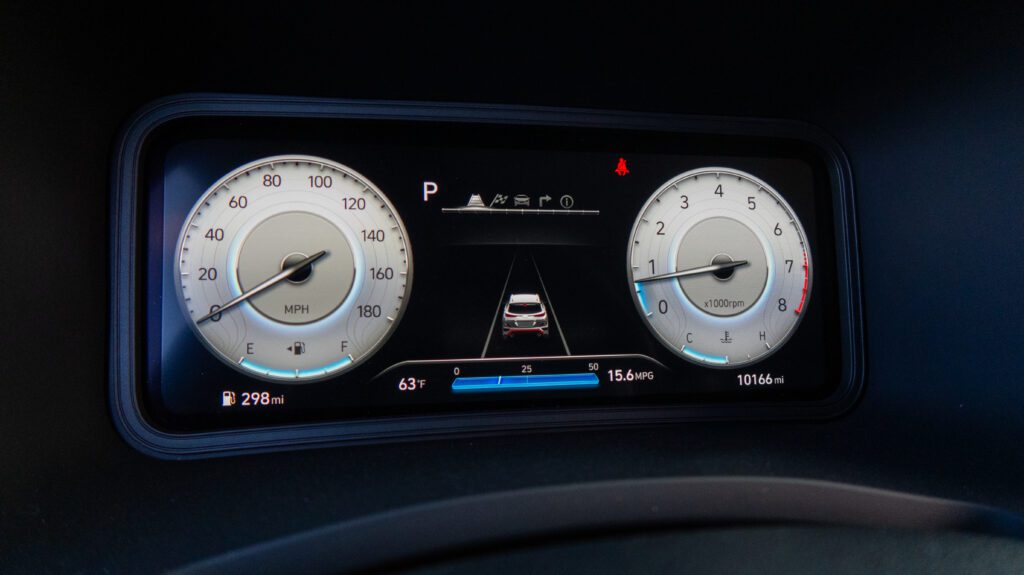
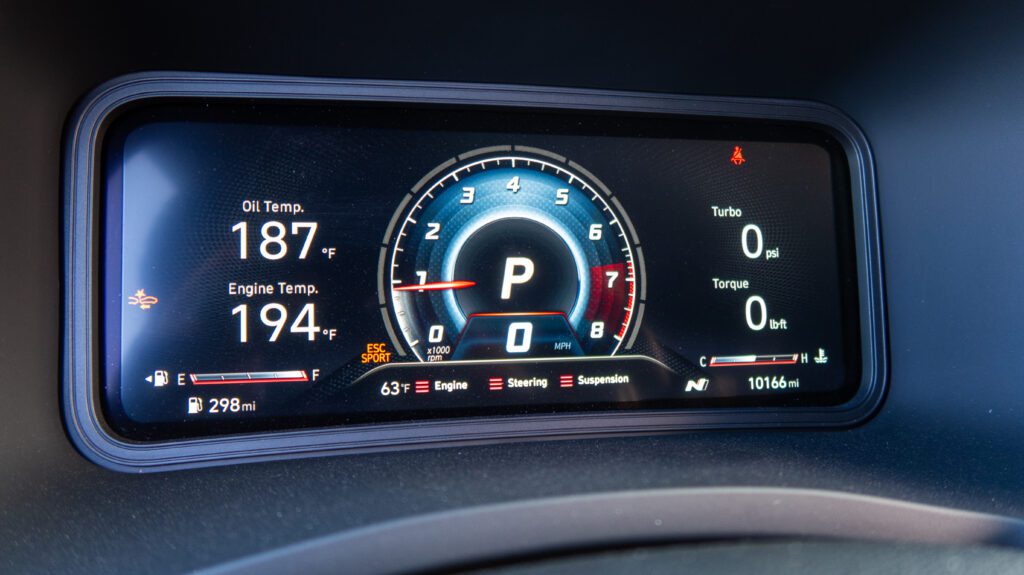
Most appealing has to be the comfort seats, which retain enough bolstering for spirited drives but with more padding for long hauls versus the Elantra N’s rock-hard buckets. They do a commendable job helping to iron out road imperfections, the harshness of which I find to be a bit overblown in other reviews, as the softest modes aren’t terribly stiff. Sure, it’s firm, partly due to the short wheelbase, and downsizing from the factory 19-inch wheels to 18s would also help, but it’s still totally livable. That is if you’re accustomed to a Focus RS or F80 BMW M3, I must say. Perhaps I’d say otherwise in torn and battered places like Salt Lake City, Reno, or parts of SoCal.
Interior materials are unremarkable econobox stuff, easily showing this once-$35,000-car’s $25,000 roots. Plastics are abundant, but they’re tightly bound and devoid of creaks, at least in my near 11,000-mile loaner. Fuel economy is so-so, as well. The average economy readout of my friend’s car indicated a hair below 24 mpg, which is on track considering the Kona N’s also-mid EPA ratings. Hey, it’s a hot hatch, folks! That 13.2-gallon tank should keep fill-ups relatively cheap, and they make a Kona Hybrid, anyway.
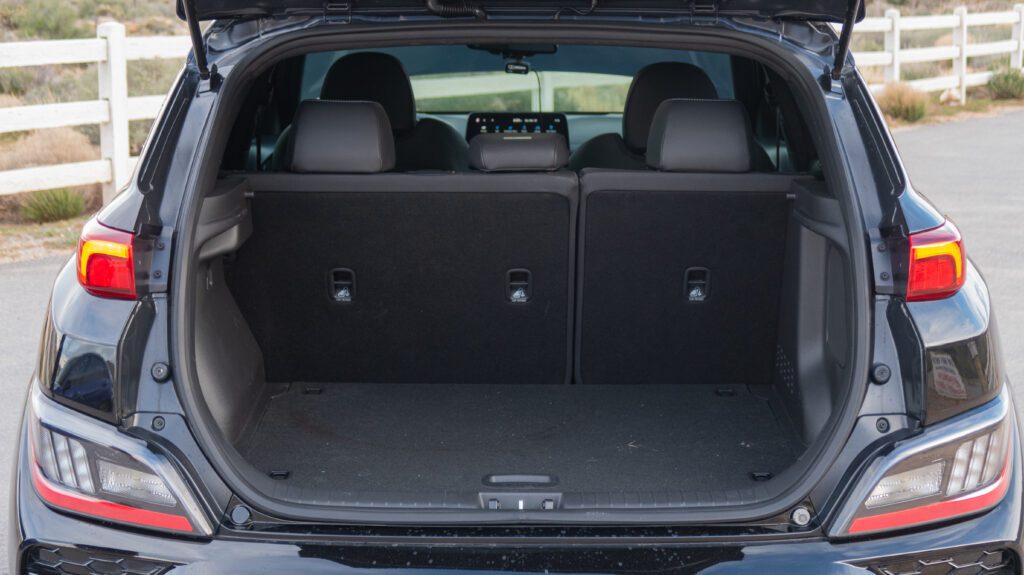
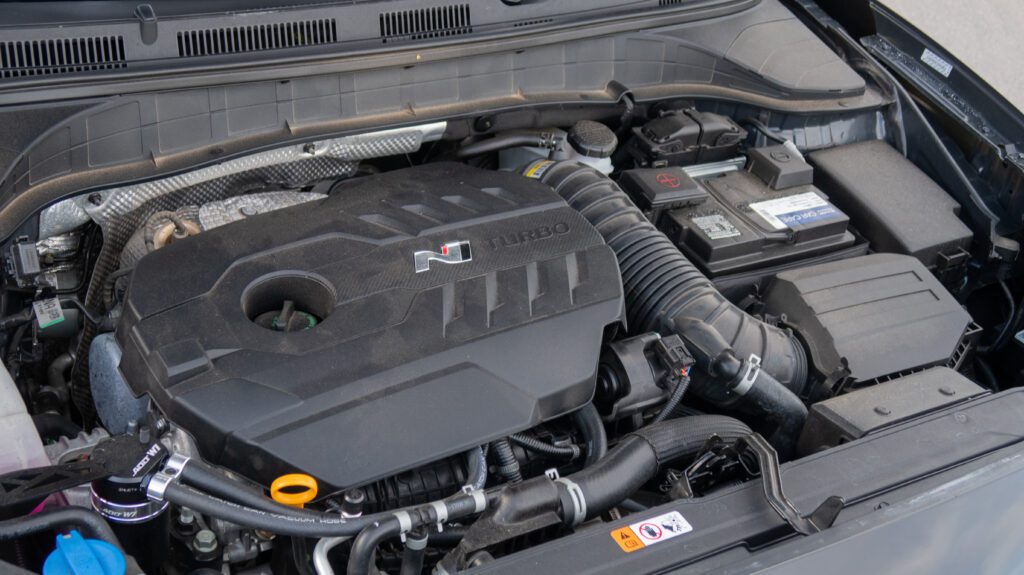
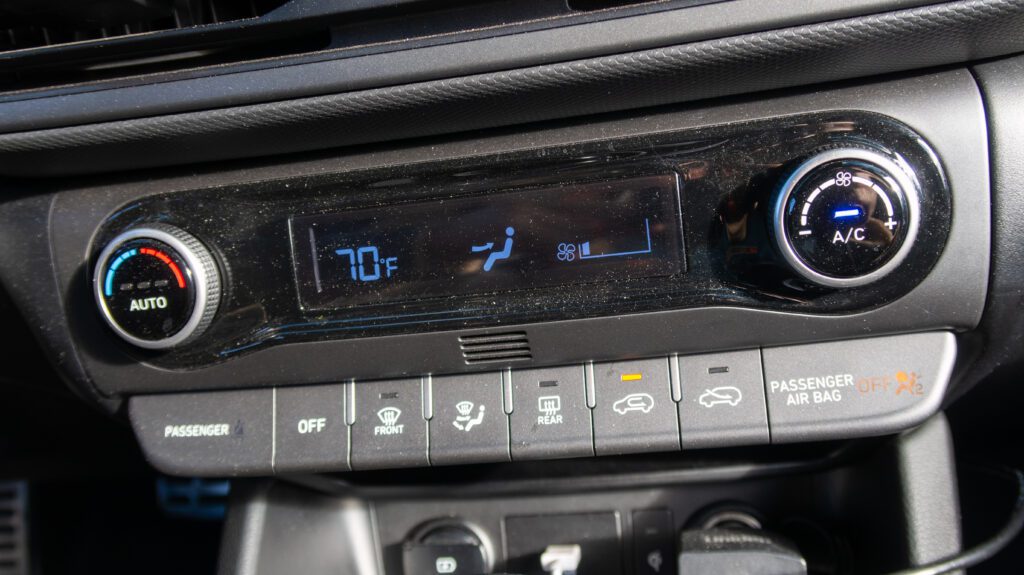
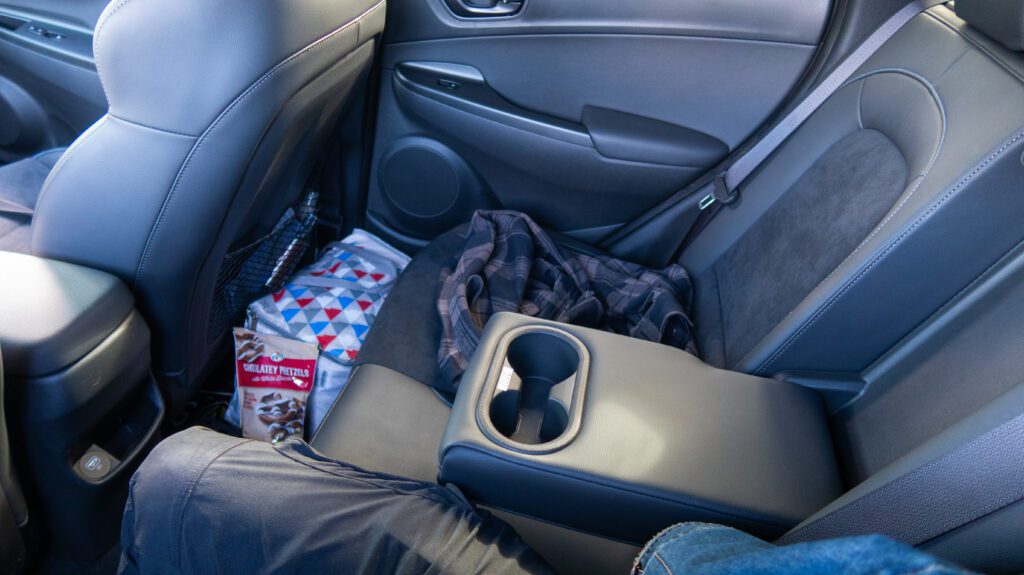
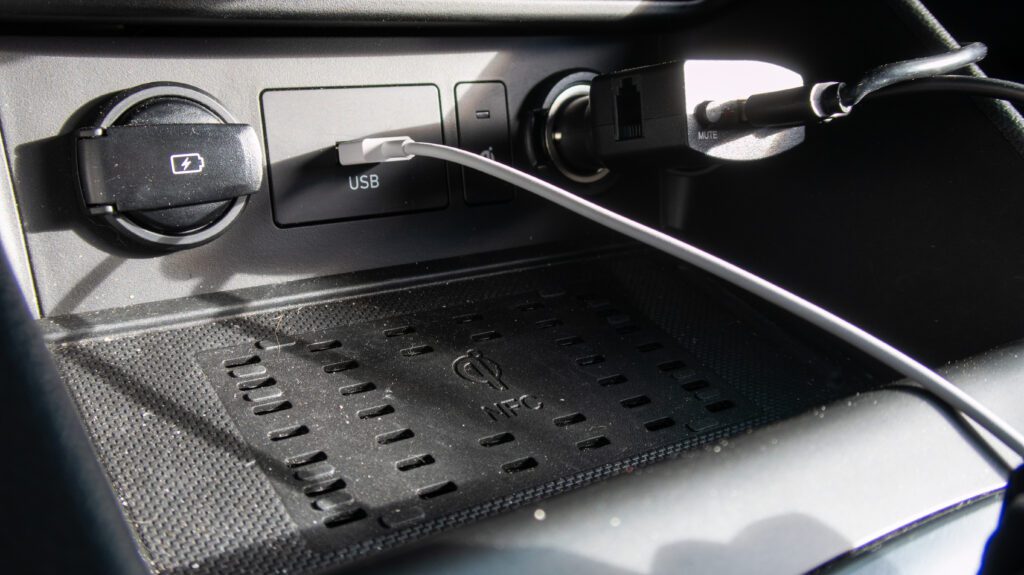
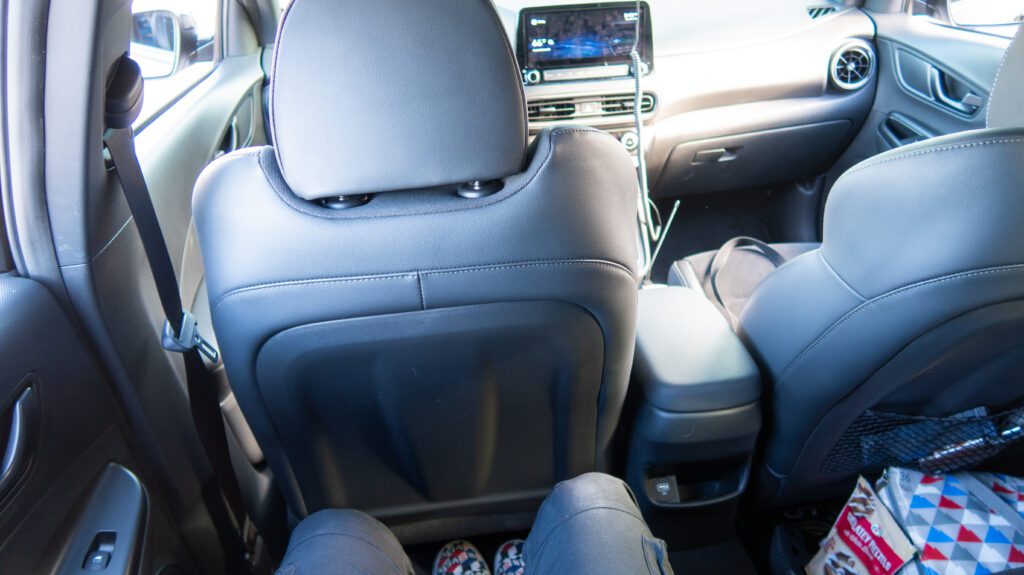
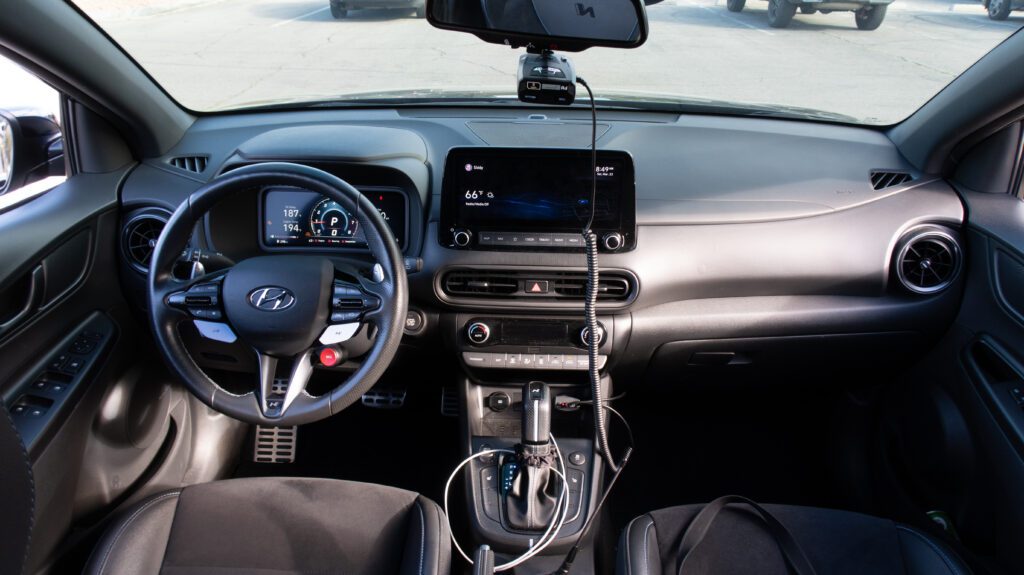
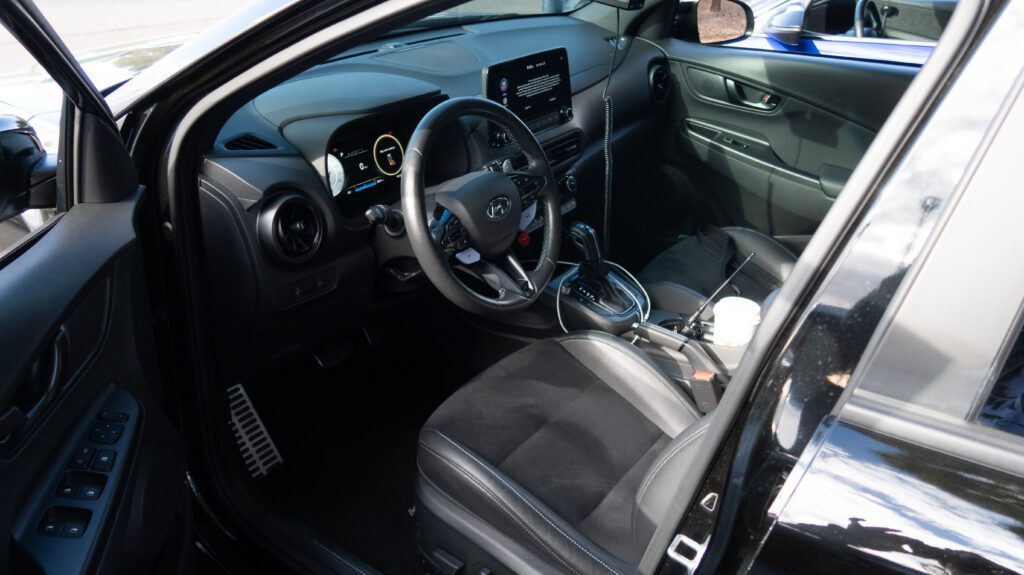
Road-going rally car
Like the Elantra N, the Kona N is a bonafide ripper and eager to take anything you throw at it with glee and ferocity, from sweeping corners to tight hairpins. It feels every bit of its M-influenced heritage and makes great use of its 289 pound-feet of torque, nudging you into your seat on every pull. The DCT is geared short and shifts snappily, always keeping you in the meat of your powerband during pulls. Manual paddle response is quick, but the gearbox is smart enough in Drive where you can leave it to its own devices, and you’d be just fine.
In German car fashion, the exhaust blats and snorts on downshifts and lift-off and changes tone between Sport/N modes and lesser modes, shifting from “kind-of sporty crossover” to “wannabe rally car.” Also in German car fashion, the engine pulls butter smooth, or at least as smooth as it can be for premium hot hatch pricing.
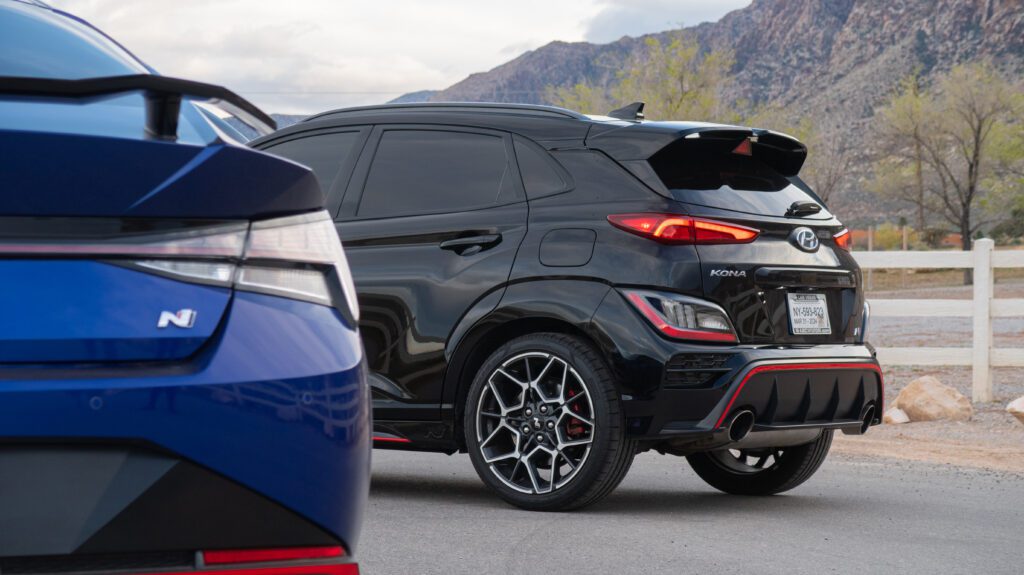
Baby Porsche Macan? In this regard, sure.
But the most Porsche-like attribute one could point out is just how sharp and confident the Kona N is once you turn that big round thing in front of your face. Sure, it’s fast. But many sport compacts these days are fast. Few are as connected and razor-sharp as this, even with its ground clearance and humble family ute beginnings. After sampling this and the Elantra, I can say that Honda’s performance car steering is better. But Hyundai isn’t far behind. The steering weighs up nicely on turn-in, and the overall weighting is appreciably hefty in Sport, although the lightness in Normal mode feels more authentic to what the Kona N really is without sacrificing accuracy.
Speaking of which, the modes appreciably make a considerable difference. It’s not a case of, “Oh, it’s a little sharper or a little stiffer than earlier.” No. Sport and Normal really are transformative, from the steering to the exhaust and the tuning of the engine and diff, bouncing between a firm family crossover with sporty steering and nothing else and a true driver’s car.
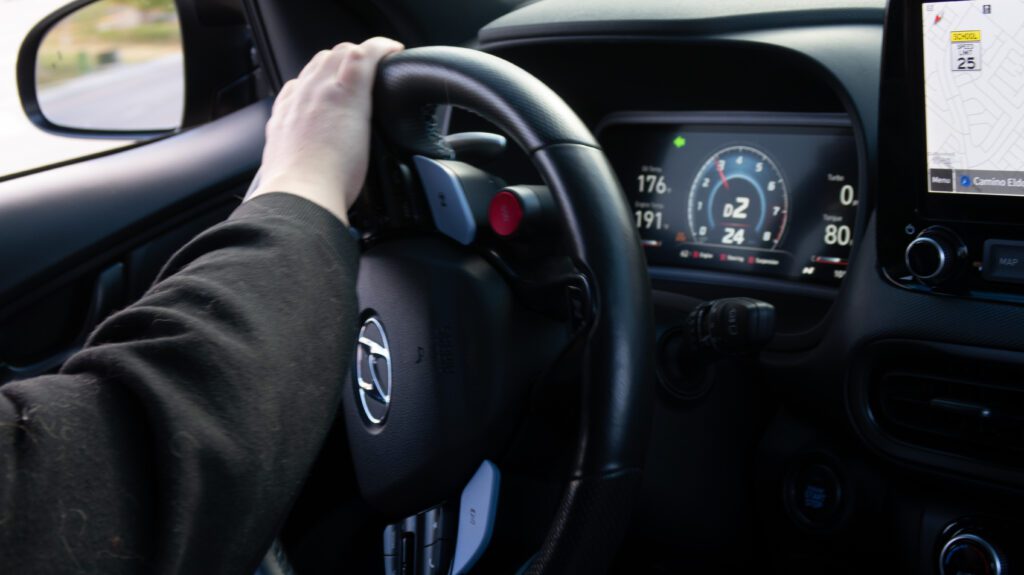
Thankfully, the Kona shares its stablemates’ N buttons, allowing drivers to custom tailor their experiences to have riotous engines but soft suspension or a more or less aggressive e-LSD mode. Keep the Kona N in its softer suspension settings, and you can tackle most tattered canyon roads without worrying about upsetting the chassis or your passenger spilling their drink in their lap… Ask me how I know. Custom drive modes for the win.
And yeah. It’s a sport compact in 2024. If you want to add extra go, grip, or glamor, there’s a sizable aftermarket ready to take your money, as the local Hyundai N clubs have proven.
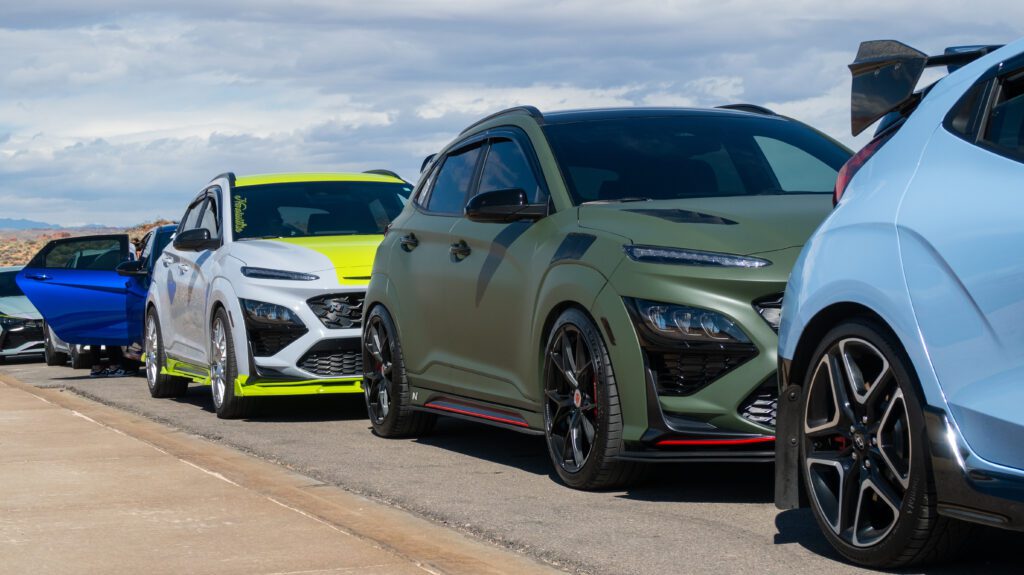
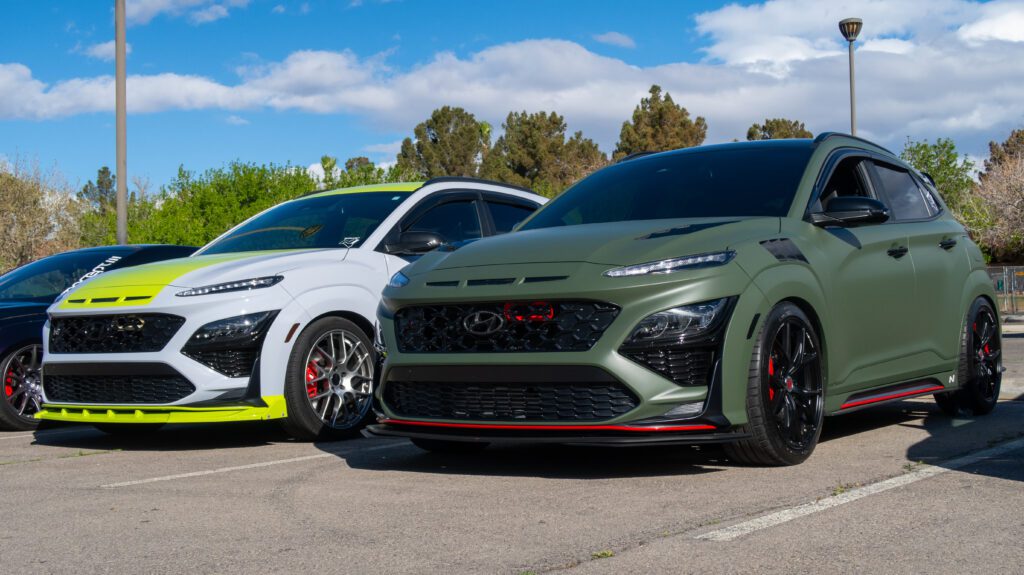
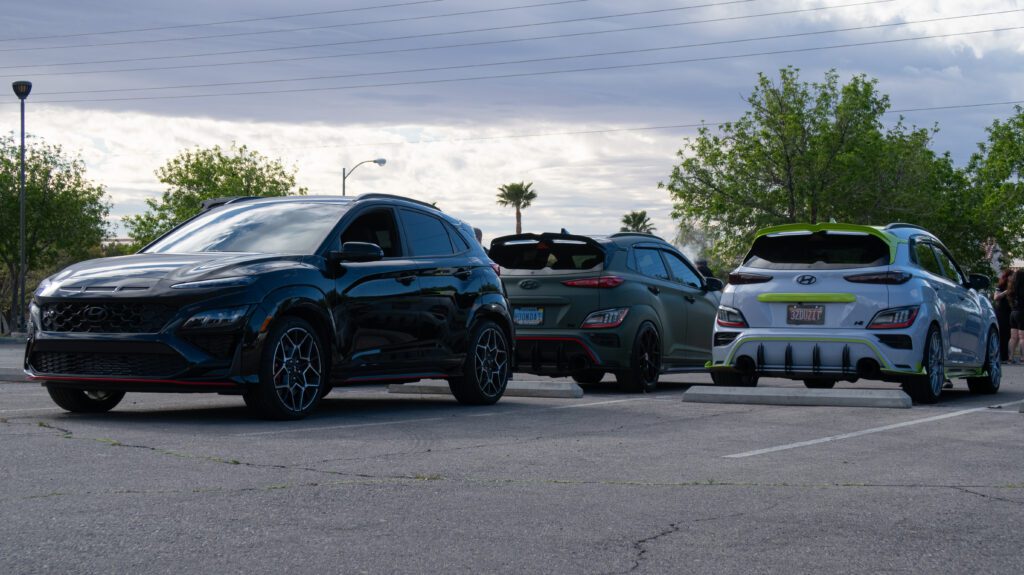
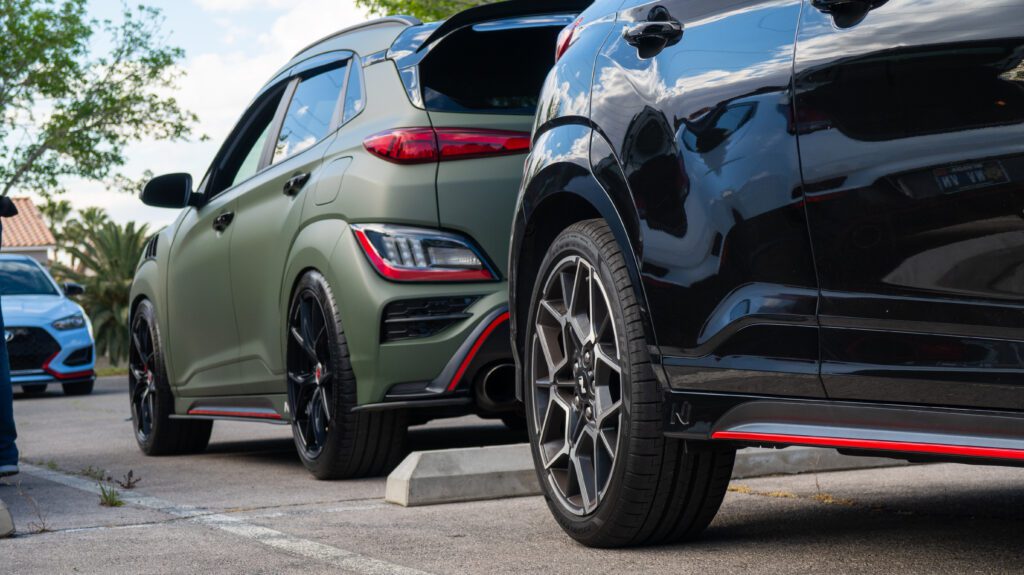
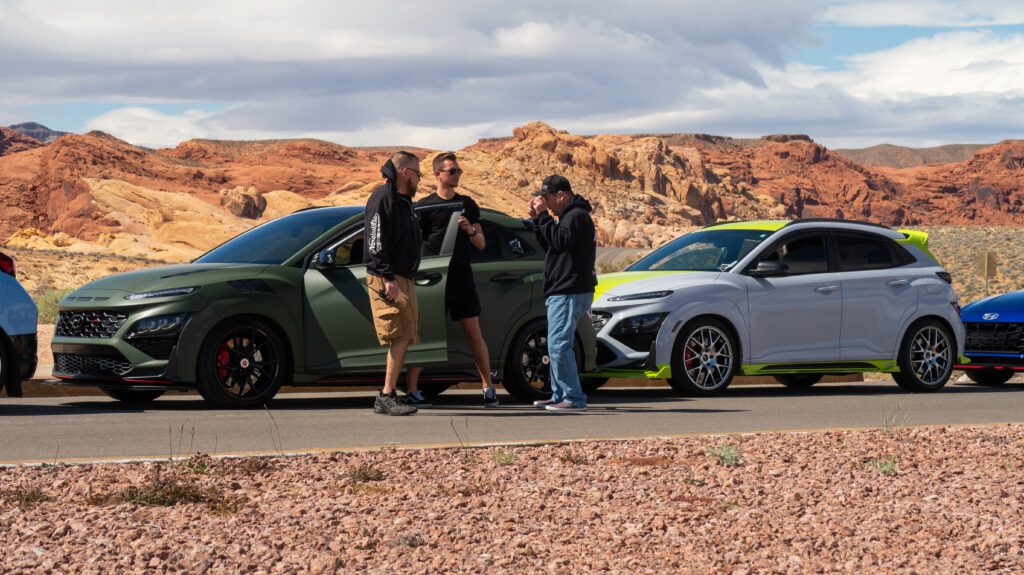
| What’s not? | – Firm ride to some, especially in sportier drive modes – Unremarkable fuel economy – Unremarkable cargo space – Might be cramped for taller individuals – Front-wheel drive only – Fuel pump concerns for modified or track-driven N cars |
[Button id=”416″]
Should you buy a used Hyundai Kona N?
So. Baby Porsche Macan. Broke Porsche Macan. Blue-collar Porsche Macan. Am I crazy for making all these Porsche comparisons? Yeah, probably. It’s far from a real Porsche. But that should speak to how enjoyable the Kona N is to even think of such a brand when you start to egg this little guy on. It’s a silly endeavor, turning a Crosstrek fighter into a track-ready hot hatch on stilts. But Hyundai did it. And Hyundai wound up with one of the most enjoyable compromises in the affordable performance car market, even if it only stuck around for a couple of years.
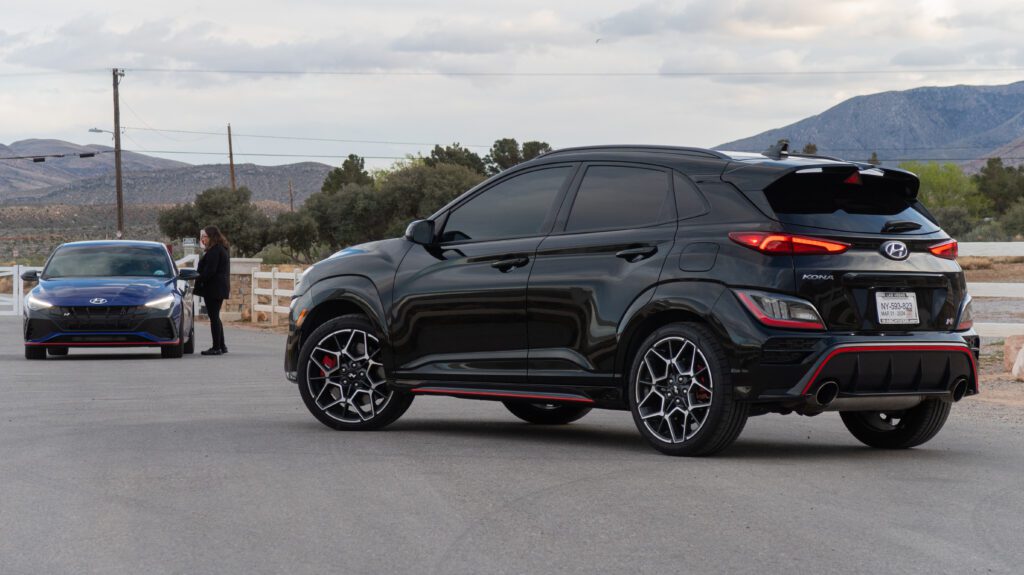
Should you buy one? You can probably guess what my answer is and the answer of any auto journo or previous owner. The question you need to ask yourself is if you can deal with the compact size and cargo area typical of this class. Is this doable, or do you need something to haul more than one or two medium-sized things from IKEA? And can you tolerate the firm suspension and ho-hum fuel economy in exchange for driving enjoyment at any opportunity? The Kona N is still indeed a usable family crossover, but it’s one Hyundai twisted and bastardized into the antithesis of an HOA Karen’s ideal SUV and a car lover’s dream (affordable) daily driver. If that sounds even the least bit appealing, then have at it, and pick yourself up one of the most unique and lovable gifts to the automotive world since, well, the last two Ns.

